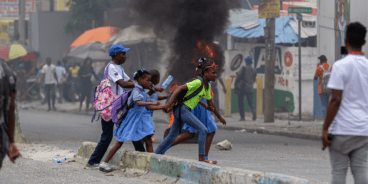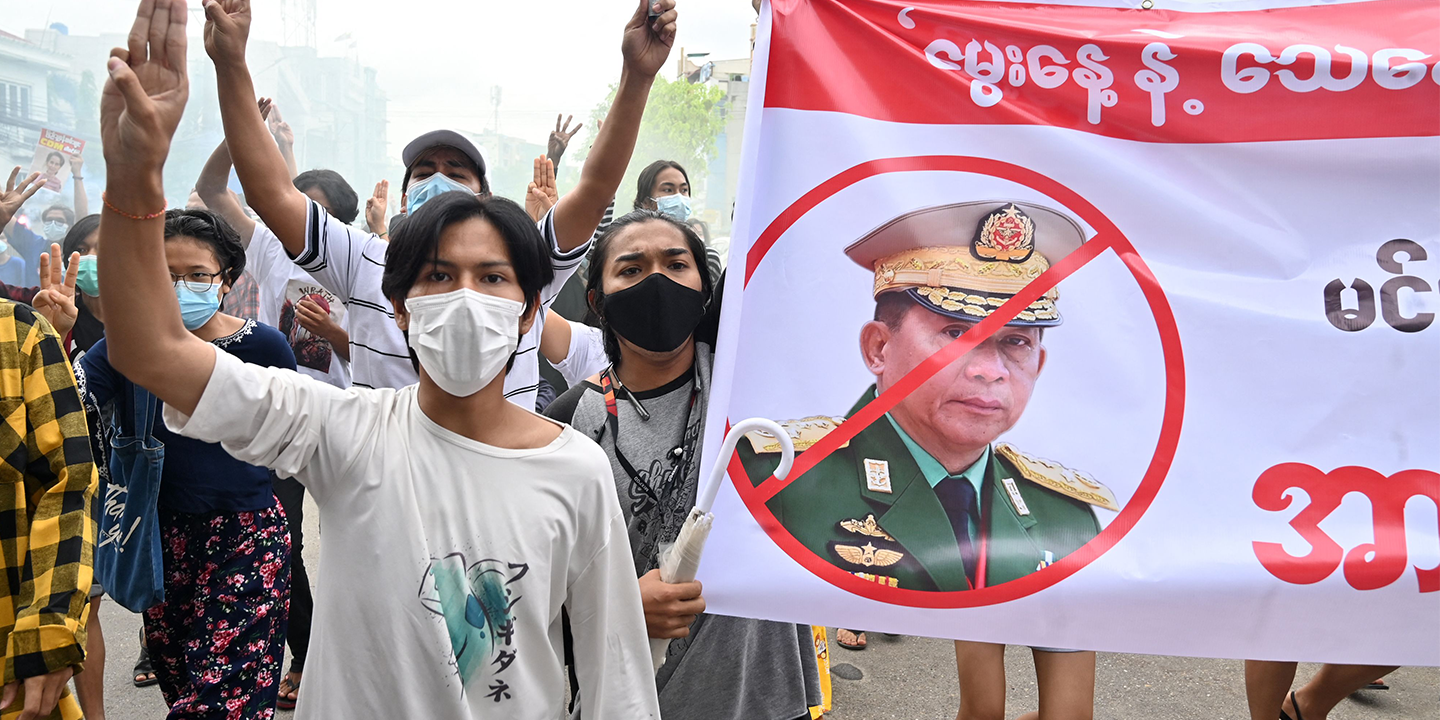

Atrocity Alert No. 264: Myanmar (Burma), South Sudan and Bosnia and Herzegovina
Atrocity Alert is a weekly publication by the Global Centre for the Responsibility to Protect highlighting situations where populations are at risk of, or are enduring, mass atrocity crimes.
CRIMES AGAINST HUMANITY CONTINUE SIX MONTHS AFTER MYANMAR COUP
Sunday, 1 August, marked six months since the military coup in Myanmar. After Commander-in-Chief Min Aung Hlaing overthrew the civilian-led government and declared a state of emergency on 1 February, millions of people peacefully protested, demanding a return to civilian rule and respect for human rights. The security forces have consistently responded to protests across the country with excessive and lethal force, recklessly using tear gas, water cannon, stun grenades and live ammunition against unarmed demonstrators. According to the Assistance Association for Political Prisoners, since 1 February at least 946 people have been killed by the security forces and 5,495 are currently arbitrarily detained, including pro-democracy activists as well as children, human rights defenders, journalists and medical personnel.
The coup also precipitated an escalation of violence between Myanmar’s Armed Forces and various ethnic armed groups, as well as “people’s defense forces” – civilian militias formed to oppose the reimposition of military rule. The UN Refugee Agency estimates that 170,200 people have been displaced by clashes in the south-east of the country since 1 February, particularly in Kayan, Kayin and Shan states. Clashes in Chin and Kachin states have also exacerbated the growing humanitarian and human rights crisis in the country.
Despite ongoing protests and the military junta’s abject failure to contain a catastrophic COVID-19 outbreak, on 1 August General Min Aung Hlaing declared himself Prime Minister and extended the state of emergency until August 2023.
The UN Special Rapporteur on the human rights situation in Myanmar, Tom Andrews, has called for an emergency “COVID ceasefire” in Myanmar and for decisive international action, arguing that, “it is critical that nations stand with and for the besieged people of Myanmar who are being held hostage by an illegal military junta. It is time for strong, focused and coordinated action that includes economic sanctions and an arms embargo.”
Since the coup, the UN Security Council has held several meetings on Myanmar, including an Arria Formula meeting on 29 July, but has not taken any substantive action. Meanwhile, on 4 August the Association of Southeast Asian Nations finally announced that they have appointed Brunei’s second minister for foreign affairs, Erywan Yusof, as their special envoy to Myanmar. More than three months after the regional group agreed to a “Five-Point Consensus” plan to end the crisis in Myanmar, none of the other proposed measures have been implemented.
Dr. Simon Adams, Executive Director of the Global Centre for the Responsibility to Protect, said that, “six months since the coup, the whole world knows that what’s happening in Myanmar constitutes crimes against humanity. Nevertheless, General Min Aung Hlaing is still getting away with murder. The military’s human rights violations and abuses are illegal under international law and should no longer be tolerated.”
42 PEOPLE KILLED IN SPATE OF EXTRAJUDICIAL EXECUTIONS IN SOUTH SUDAN
Since March the Human Rights Division of the UN Mission in South Sudan (UNMISS) has documented at least 14 incidents in Warrap State that have resulted in the extrajudicial execution of 29 men, including boys and elderly men. According to UNMISS, eyewitnesses reported that, “the victims were allegedly removed from prison or police custody and brought before local officials for ‘sentencing’ … some men were taken to remote areas, tied to trees, and executed by firing squad.”
The UN Commission on Human Rights in South Sudan (CHRSS) found that members of the South Sudan People’s Defence Forces, the National Police Service or the National Security Service carried out the executions or were in the vicinity at the time of the killings. At least 13 people have also reportedly been arbitrarily executed “at the instruction of state officials” in Lakes State since mid-June.
The spate of extrajudicial executions coincides with the appointment of Aleu Ayieny Aleu as the Governor of Warrap State. Upon his appointment in January, Governor Aleu pledged to end inter-communal violence and restore peace and stability to Warrap State. He also allegedly encouraged violence against “thieves and criminals.” Most of the individuals extrajudicially executed in Warrap State were accused of criminal activity and were not given access to a fair trial.
Yasmin Sooka, Chair of the CHRSS, said that, “the brazen and cruel manner of [the extrajudicial] executions illustrates and reinforces a disturbing dysfunctionality of governance and society, and is in complete disregard of the human rights of alleged suspects.” The CHRSS found that the authorities were exploiting local disputes and using extrajudicial executions to garner public support. Weak state structures, as well as a lack of trust in the justice system, has driven some communities to favor extrajudicial executions as a means of ending the cycle of retaliatory inter-communal violence.
South Sudan’s transitional government needs to urgently invest in the judicial sector, and expeditiously establish the transitional justice mechanisms agreed to in the 2018 peace agreement. Local and state authorities need to respect and protect human rights, including the rights of criminal suspects to due process and a fair trial, and strictly adhere to the rule of law. All alleged extrajudicial executions should be properly investigated and those responsible held to account. The government must also address the underlying causes of inter-communal violence, including local competition for access to resources and power.
BANNING GENOCIDE DENIAL IN BOSNIA AND HERZEGOVINA
On 23 July Valentin Inzko, the outgoing UN High Representative for Bosnia and Herzegovina, issued a decree outlawing the glorification of convicted war criminals and the denial of genocide, crimes against humanity and war crimes. The decree introduced jail terms of up to five years for anyone who “publicly condones, denies, grossly trivializes or tries to justify” atrocities committed during the 1992-1995 Bosnian war. The amendments were announced amidst an increase in divisive political rhetoric glorifying convicted perpetrators such as Ratko Mladić, former Commander of the Bosnian Serb Army. On 8 June an international appeals chamber in The Hague upheld Mladić’s conviction for genocide, war crimes and crimes against humanity.
Some Bosnian Serb politicians have refused to accept Inzko’s decree. On 30 June the parliament of the Serb Republic – one of the two major political components of Bosnia and Herzegovina – unanimously adopted its own legal amendments in order to punish individuals who “disparage or label the Serb Republic or its people as genocidal or aggressor.”
The UN Special Adviser on the Prevention of Genocide, Alice Wairimu Nderitu, stressed that the “denial of genocide, war crimes or crimes against humanity, as well as glorification of those who have committed such crimes, simultaneously feeds on and strengthens contested narratives about the past, the present and the future. It turns perpetrators and war criminals into heroes. It sows fear, mistrust and hate. It divides people, communities and States.”
Acknowledging and pursuing accountability for past atrocities is a crucial part of the ongoing struggle for truth, reconciliation and non-recurrence. It is imperative that all victims and survivors of genocide, war crimes and crimes against humanity perpetrated in Bosnia and Herzegovina receive the recognition and justice they deserve.
Related Content


Expert Voices on Atrocity Prevention Episode 43: Adama Dieng
